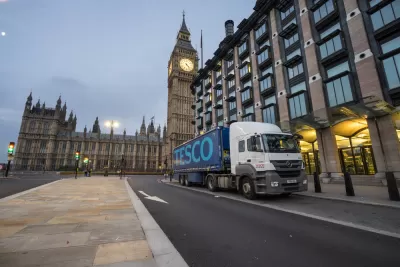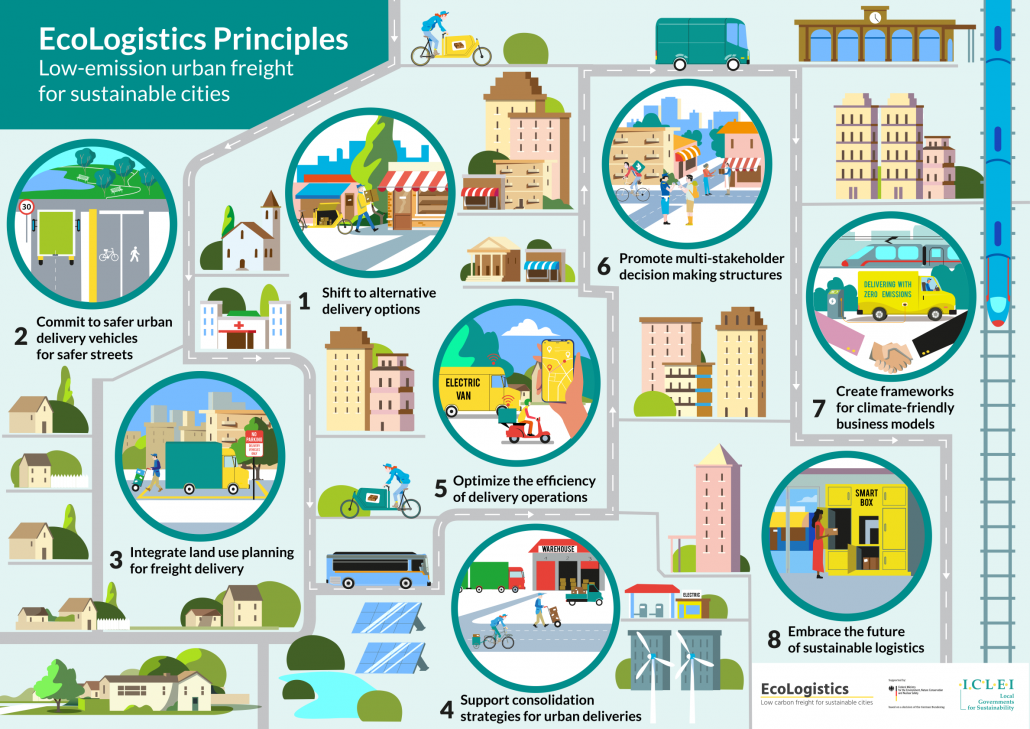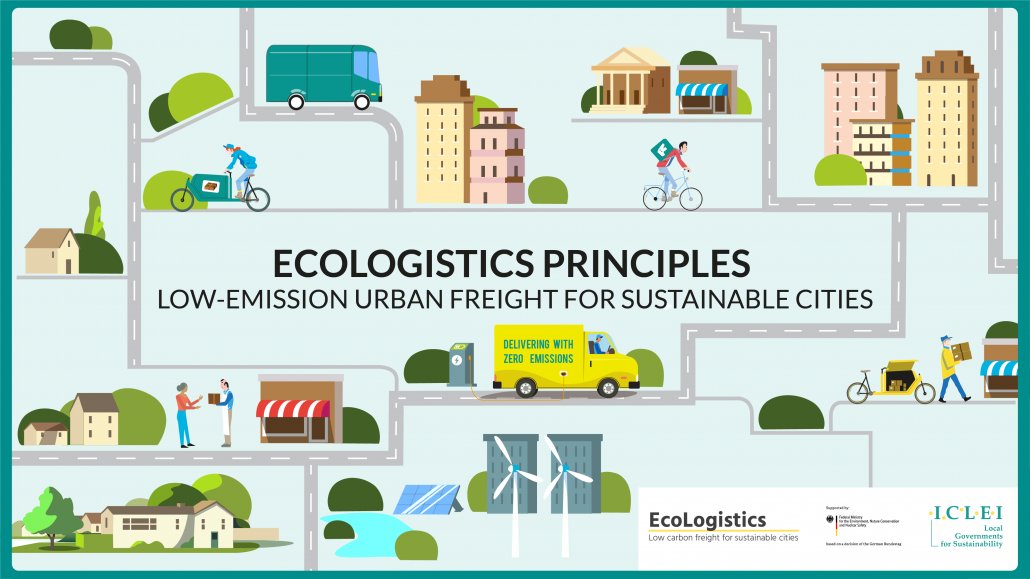The EcoLogistics Community's new EcoLogistics Principles provide guidance for local communities to develop more efficient goods distribution systems, a key component of sustainable urban transportation.

The EcoLogistics Community's new EcoLogistics Principles provide specific guidance to local governments for creating more resource-efficient urban goods distribution systems. This is critical for more sustainable transportation and more livable communities. The website include a variety of resources, including well-illustrated posters and slide decks.

EcoLogistics Principles
1. Shift to alternative delivery options
Last mile deliveries account for one quarter of logistics supply chain emissions and are often inefficient. These deliveries can be shifted to sustainable delivery options using non-motorized vehicles, and the use of electric vans should be promoted to improve efficiency and performance of the urban freight system. Low-emission alternatives to road transport, such as waterways and urban rail can also reduce emissions.
2. Commit to safer urban delivery vehicles for safer streetsDelivery vehicles, in particular heavy trucks, are disproportionately responsible for traffic injuries and fatalities. A comprehensive program for safer vehicles, speeds, streets and behaviors can reduce the likelihood of road crashes. Governments can enforce a safe system for vehicles and fleet operations, raise driving standards and ensure compliance, provide targeted training and reduce speed limits to protect vulnerable road users where infrastructure must be shared.
3. Integrate land use planning for freight delivery
Land use is generally planned and implemented at the local level, using the comprehensive plan, zoning code and permitting system. City policymakers should introduce policies and rules for the movement of goods into urban planning. Land use planning policies should take into account the management of curb space for freight vehicles, waiting and loading/unloading bays and shared use for deliveries.
4. Support consolidation strategies for urban deliveries
Consolidation allows for improved load utilization and can reduce delivery vehicle numbers and kilometers. Small urban consolidation centers, in combination with electric vehicles and cargo bikes, can enhance urban delivery cost- and energy-efficiency. Governments can identify suitable funding models and provide adequate infrastructure for appropriate consolidation and distribution activities.
5. Optimize the efficiency of delivery operations
With ever-improving data collection technologies, urban freight service providers can use services such as route optimization, telematics for vehicles, driver monitoring and training to improve delivery operations. Governments can use collected data to understand the freight movement in their cities and make informed decisions.
6. Promote multi-stakeholder decision making structures
Sustainable urban freight is difficult to achieve without the active engagement and support of stakeholders in both public and private sectors. Urban freight roundtables and forums should be established for efficient and targeted discussions and negotiations.
7. Create frameworks for climate-friendly business models
New business models and technological innovations may radically change the way the freight industry operates. Policymakers should introduce regulatory and pricing incentives and procurement policies to support the use of low emission vehicles and create frameworks that enable freight operators to move toward climate-friendly business models.
8. Embrace the future of sustainable logistics
Advances in technology make just-in-time deliveries for many commercial establishments and consumers possible. Local governments should use communications channels and campaigns to raise awareness of the impact of delivery options and encourage consumer behavior change. Policy-makers can also set up training programs for logistics jobs to raise the profile of the freight sector.

FULL STORY: EcoLogistics Principles

Maui's Vacation Rental Debate Turns Ugly
Verbal attacks, misinformation campaigns and fistfights plague a high-stakes debate to convert thousands of vacation rentals into long-term housing.

Planetizen Federal Action Tracker
A weekly monitor of how Trump’s orders and actions are impacting planners and planning in America.

Chicago’s Ghost Rails
Just beneath the surface of the modern city lie the remnants of its expansive early 20th-century streetcar system.

Bend, Oregon Zoning Reforms Prioritize Small-Scale Housing
The city altered its zoning code to allow multi-family housing and eliminated parking mandates citywide.

Amtrak Cutting Jobs, Funding to High-Speed Rail
The agency plans to cut 10 percent of its workforce and has confirmed it will not fund new high-speed rail projects.

LA Denies Basic Services to Unhoused Residents
The city has repeatedly failed to respond to requests for trash pickup at encampment sites, and eliminated a program that provided mobile showers and toilets.
Urban Design for Planners 1: Software Tools
This six-course series explores essential urban design concepts using open source software and equips planners with the tools they need to participate fully in the urban design process.
Planning for Universal Design
Learn the tools for implementing Universal Design in planning regulations.
planning NEXT
Appalachian Highlands Housing Partners
Mpact (founded as Rail~Volution)
City of Camden Redevelopment Agency
City of Astoria
City of Portland
City of Laramie


























